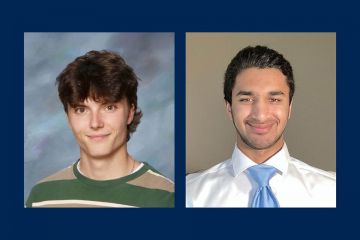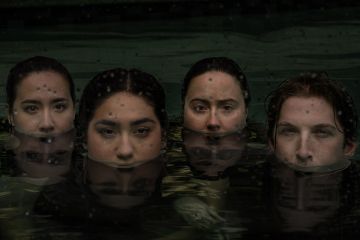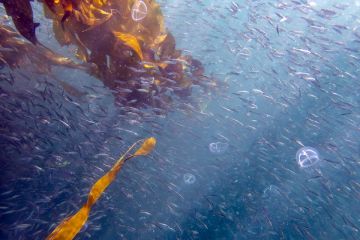UVic Profs Key Participants In International Science Education Project
Two UVic education professors--Drs. John Anderson and Larry
Yore--are key members of an international team recently awarded a
$5.9 million(US) National Science Foundation (NSF) grant to transform
the way children are taught science in rural elementary schools.
Anderson and Yore will be the external evaluators of the five-year project, entitled "Science Cooperatives: Effecting Local Systemic Change in Rural Missouri and Iowa," The project will form 10 cooperatives from 38 school districts and include more than 1,400 teachers and 20,000 elementary school students. It will organize small independent school districts into cooperatives that will share resources to meet common instructional concerns and the professional development needs of their elementary teachers.
The project will bring together teams of teachers, parents, scientists, and science educators to make science meaningful for children. It will stress inquiry science in the classroom, involving investigating science ideas with hands-on and minds-on activities, print materials and electronic resources.
Yore, Anderson, and the project leader--James Shymansky, professor of science education at the University of Missouri-St. Louis--have collaborated on two earlier science education projects at the University of Iowa which laid the basis for the current study. Those projects improved teachers' classroom practices, students' achievement and attitudes, and parents' interest in and support of school science.
The Science Cooperatives Project is designed to address the needs of one of the most under-served areas in North America's education system: isolated small rural schools.
The Faculty of Education at the University of Victoria has been a leader in providing credit and non-credit programs to teachers across the province. Both UVic and the University of Iowa have provided distance education courses in science education and other fields using two-way interactive video and internet delivery. These new information technologies will be critical components of the Science Cooperatives Project.
Anderson brings to the project his rich experience and expertise in large sample assessment projects, the Third International Mathematics and Science Study, and statistical analysis used to develop and verify research instruments, manage databases, and analyze data. Yore's long experience and work with international science curriculum reforms, professional development, and language and science education will be utilized to plan, monitor, and evaluate the project's development. Yore will also serve on the project advisory board and coordinate research activities for the project.
NSF support will be supplemented by funds from the Howard Hughes Medical Institute, the Des Lee Family Foundation, and in-kind contributions by the cooperating school districts and universities in Iowa and Missouri.
The project will provide opportunities for several PhD and faculty research studies over the next five years.
Anderson and Yore will be the external evaluators of the five-year project, entitled "Science Cooperatives: Effecting Local Systemic Change in Rural Missouri and Iowa," The project will form 10 cooperatives from 38 school districts and include more than 1,400 teachers and 20,000 elementary school students. It will organize small independent school districts into cooperatives that will share resources to meet common instructional concerns and the professional development needs of their elementary teachers.
The project will bring together teams of teachers, parents, scientists, and science educators to make science meaningful for children. It will stress inquiry science in the classroom, involving investigating science ideas with hands-on and minds-on activities, print materials and electronic resources.
Yore, Anderson, and the project leader--James Shymansky, professor of science education at the University of Missouri-St. Louis--have collaborated on two earlier science education projects at the University of Iowa which laid the basis for the current study. Those projects improved teachers' classroom practices, students' achievement and attitudes, and parents' interest in and support of school science.
The Science Cooperatives Project is designed to address the needs of one of the most under-served areas in North America's education system: isolated small rural schools.
The Faculty of Education at the University of Victoria has been a leader in providing credit and non-credit programs to teachers across the province. Both UVic and the University of Iowa have provided distance education courses in science education and other fields using two-way interactive video and internet delivery. These new information technologies will be critical components of the Science Cooperatives Project.
Anderson brings to the project his rich experience and expertise in large sample assessment projects, the Third International Mathematics and Science Study, and statistical analysis used to develop and verify research instruments, manage databases, and analyze data. Yore's long experience and work with international science curriculum reforms, professional development, and language and science education will be utilized to plan, monitor, and evaluate the project's development. Yore will also serve on the project advisory board and coordinate research activities for the project.
NSF support will be supplemented by funds from the Howard Hughes Medical Institute, the Des Lee Family Foundation, and in-kind contributions by the cooperating school districts and universities in Iowa and Missouri.
The project will provide opportunities for several PhD and faculty research studies over the next five years.
-- 30 --
In this story
Keywords: uvic, profs, key, participants, international, science, education, project




